The story of the HMVH Corporation BBS- by Herby Hönigsperger Or: The illustrated, unadulterated, and shamelessly long-winded personal memoir of a ten-year journey through the South African BBS scene. PrologueBefore there was ubiquitous, fast, and mobile access to immersive, graphic-intensive, and intrusive social networks and forum communities like Facebook and 4chan, there existed version 1 of a World-Wide Web. Even before the WWW, there was an Internet. And before that there were Bulletin Boards. A BBS is nothing more than a computer hooked up to a phone line via modem, or several computers linked to each other and to several phone lines. Numerous ordinary PC users have started a BBS from their homes simply because it sounded like fun, not to mention it sounding rather glamorous to be called a sysop - or system operator. This is the story of one such relic. This is the story of a lone, stationary device that one could dial into with an analogue modem and communicate with at the blistering speed of 28kbps (on a lucky day). From another stationary device. So that you could view text. Or download a few files, or play some games. In 80x25 text mode. In glorious 16 colours -- if your terminal supported it and the BBS offered it. Or post a few messages which would arrive at their destination within a day or three. Them were the wild days of yore. This page will not only reveal the sordid history of the HMVH Corporation BBS, but also where its SysOp came from and the environment he operated in. It's a story that's reflective and relevant to the author. You, the reader, may not necessarily be interested in his trials and tribulations; you may not give a hoot about the painful memories, the small victories, and the new experiences. But it is honest. You see, unlike many of my (mostly international) peers in the same age group, I can't brag about having had any experience with the Amiga, Apple II, Atari, Commodore, or ZX Spectrum computers that were popular during the eighties. I never had access to a computer as a kid (let alone owned one), nor was I part of a university faculty that attempted to network VAX machines, IBM mainframes and Sun workstations. Other than reading about them in (mostly foreign) magazines or ogling them in specialist electronics shops, computers remained strictly within the domain of well-heeled private citizens, large corporations, or the academia. Worse, still, was that stale and dry computer course I once took as an extracurricular activity after school -- you know, the one that teaches you everything about Charles Babbage and Boolean algebra, but with nothing resembling a computer in sight. It was awful. All I knew was that one day I simply must have one of these computer things -- because, well, this was an impressionable teenager who'd seen "Tron" and "WarGames". Computers are the future. GenesisApril 1988 found a few technicians and a trainee driving from one microwave repeater tower to another, doing the maintenance task of white noise tests and graphing the measurement results on an actual computer. Yes, finally, a real computer! 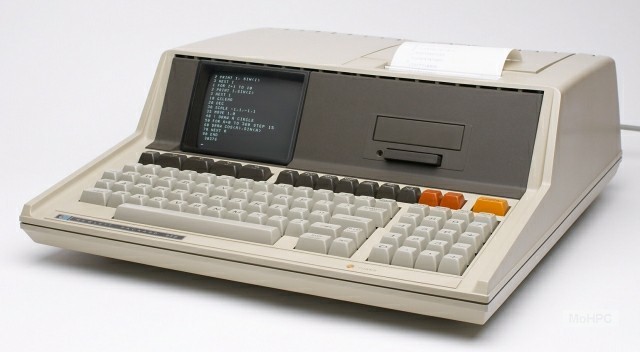
Image via the Museum of HP Calculators © David G. Hicks It was a Hewlett-Packard 85B oversized calculator type of computer that I had chance to work with for a few weeks. Idle time was spent figuring out what else you could do with this beast, learning a bit of BASIC, collecting and writing various silly programs, and printing a whole load of nonsense and jokes -- on a plotter. I still have a tape cartridge full of programs. 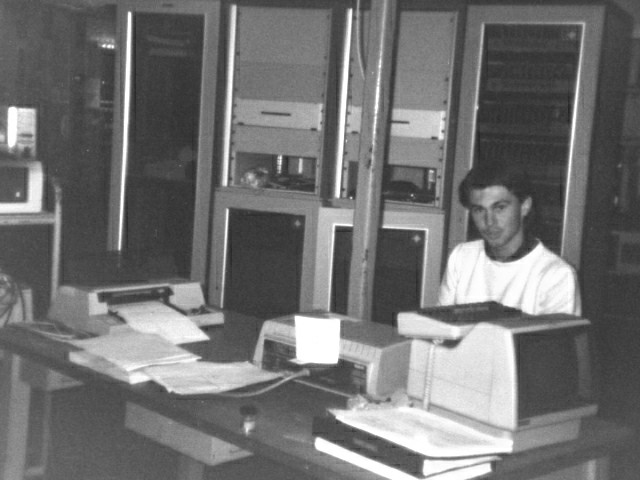
After this tour of duty ended, that was it for the next two years. No more computers for a while. The closest to any CPU time we got was messing around with a few Siemens T-1000 teletype machines. 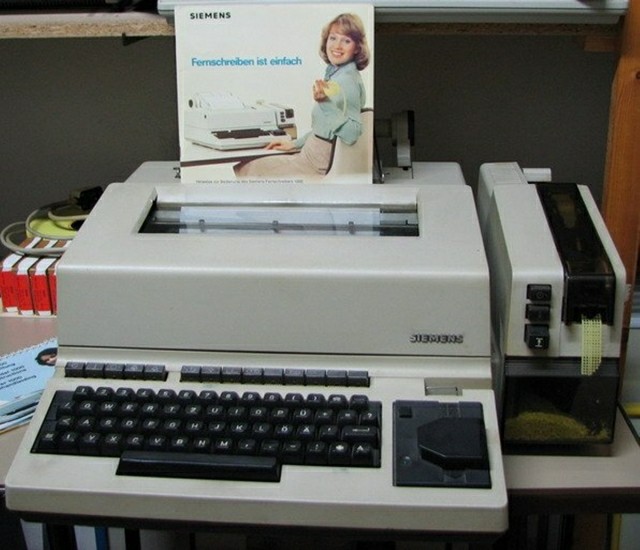
During the silly season stations sent series of messages to and fro, read from old streams of ticker tape that printed out Christmas trees and similar ribaldry. While they may have hardly been "computers", these T-1000s did introduce me to what we later knew as ASCII Art. The age of enlightenmentMy personal dawn in the modern computer era occurred in late 1990 -- at my "permanent post", in my new office job. This office had several awful green-screen dumb ICL terminals, Siemens T-1200 teletype machines, and computers. Real computers! I distinctly remember there having been three 286-class PCs and one Olivetti 386SX/16 PC when I started there. Only the 386 had a colour VGA display, and that's the computer that Nick Reyneke, our resident statistician/programmer occupied all day long. Nick taught me what was behind that ominous C:\> prompt, and he had an entire arsenal of programs, utilities, games, demos, and data files at his disposal. For all intents and purposes, Nick was the Zen Master. Computers seemingly appeared everywhere, all of a sudden there was an abundance; friends, colleagues, everyone just had to get one, and usually in a standard clone configuration of an 80286 with 1MB RAM, an ST-157A 40MB HDD, 1.2MB floppy, and Hercules video. Not me, though, no sir, there's no way the office PC was going to upstage mine. I had to one-up my friends and colleagues. In October 1991 I took the plunge and bought my very first PC from a store called Micro Matrix in Pretoria: a 386SX/16 with 2MB RAM, an 80MB HDD, 1.2- and 1.44MB floppy drives, 256kB colour SVGA, a Seikosha SP2400 dot matrix printer, and a Genius mouse. Oh yeah, I was the king of the hill -- I had a mouse. I'm the one who got the brand spanking new MS-DOS 5.0 to go with his hot new machine. I'm the one who spent ages tuning EMS/XMS, getting DOS HIGH, hoarding and pirating games and software, and eventually discovering GIF images. Colourised and modified with Dr. Genius. Note the signature used. I felt like I had reached the peak of a misty mountain. Then Nick pulled out his secret weapon: a 2400 bps modem. The fog subsided. I could see more of the mountain range, the taller peaks, and more zen masters. Suddenly I felt like David Lightman finding the back door to WOPR, a portal to a new dimension a mere sequence of digits away; one in which you could connect to and interact with other users and their computers and services called bulletin board systems for the mere cost of a local (or long-distance) phone call. There was oh, so much to explore out there, so much to see and read and download and play and interact with that it wasn't long before I signed up on several BBSes. One of these was Graphics BBS, run from Brakpan by a fellow named Hein. His board specialised in GIF files, and he offered a scanning service. The pinnacle of computer graphics and shopping skills So one dark night I took a drive out to the hinterlands of the far East Rand to have a few pictures scanned in. I got to take a closer look at this mythical BBS device and forked out R120.00 for the annual subscription. In that year we probably downloaded most everything from his BBS, irrespective of how shitty the bounty of each painfully slow downloading session turned out to be. The girl's hot, the scan's not Now, having recapped all that, what needs to be mentioned is the socio-political environment of South Africa in 1992. Realise that a picture like the one above could've landed you in hot water. In fact, a SysOp could get locked up or fined for it. Nudity and pornography were quite "verboten" in those calvinistic days; even some of the so-called "subversive literature" readily available on many BBSes might have resulted in you accidentally falling down a flight of stairs while in police custody a scant five years before. Ironically, civil unrest, riots and domestic terrorism during our own little perestroikan period ensured that law enforcement agencies had better things to do than poke their moustachioed noses into people's hard drives, tap into international phone calls or screen every postage parcel. Although the strict censorship laws weren't actively enforced anymore, they hadn't been repealed either. It would take another few years before, in a surprising 180-degree turn, censorship would be declared little short of unconstitutional. In hindsight, having joined the online foray in 1991 only, it'd be very interesting to learn about the country's scene during its even earlier years. In fact, is "scene" a suitable term for the early years? Wasn't it, by virtue of the fact that it wasn't widespread and largely passed under the radar of the state, "underground" by default? Which was the first South African BBS, and when was it launched? What kind of features and files did they offer, and did they ever have any run-ins with the thought police? Was it a big one like Netline or one of the Catalyst systems, or was it some little covert BBS that only those in the underground scene knew of? Or was it perhaps Harry Brindley's Ideas BBS from the early 80's? We may never know for sure. What is known is that by May of 1993 there were at least 130 BBSes operating in South Africa, with some of the commercial ones accessible via as many as eight lines. By February 1994 Roblist documented about 150 local boards. Although by now everyone and their dog were buying PCs at a furious rate (the decision boosted by the inclusion of Windows 3.x), the fewest people actually bothered with modems. It could almost be said that the private citizens or forward-thinking businesses who operated or used bulletin board systems at the time were intelligent and liberal pioneers. Yes, I was proud to be mingling with this exclusive online aristocracy, and I soon became the default go-to guy for any tools, data, and advice you needed within my circle of friends, foes, and colleagues. I became their Zen Master. When two bugs bitePromiscuity does not unpunished go: enter EXEBUG, a most nasty home-grown virus that had me literally tearing up my 386 PC in sheer frustration. By March 1993 I had rebuilt and upgraded the machine, leaving spares that could be used to... well, will be used to launch my own BBS. Why not?! But what to call it? "Just use HMVH Corporation," colleague Dave Liebenberg quipped, "you're already using that name -- whatever it means." And so it was settled. A blazing new external 14k4 V.42bis modem (via the annual Computer Faire at the NASREC show grounds) and larger hard drives were obtained, all the needed software, configure and design ASCII/ANSI screens and menus, make a few test runs and... oh, crap! Must get one of these... 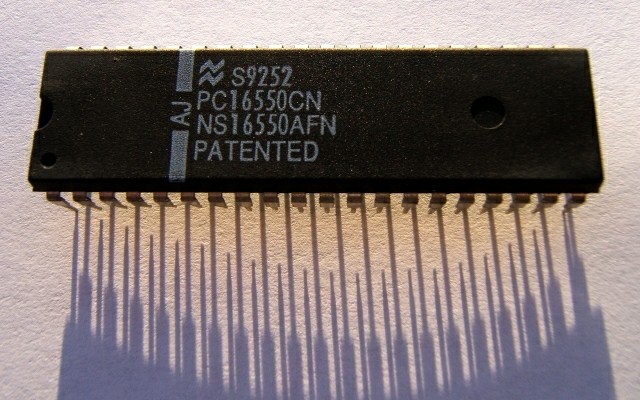
...from the MHO Electronics supplier in Edenvale, then more screen re-designs, add content and files, have a dedicated phone line installed, still more tests -- until, finally, on the 28th of June 1994 the HMVH Corporation BBS went online. The first user called in not long after. I felt like a god... ...until the modem's power supply blew. On the 10th of August the BBS was mothballed. 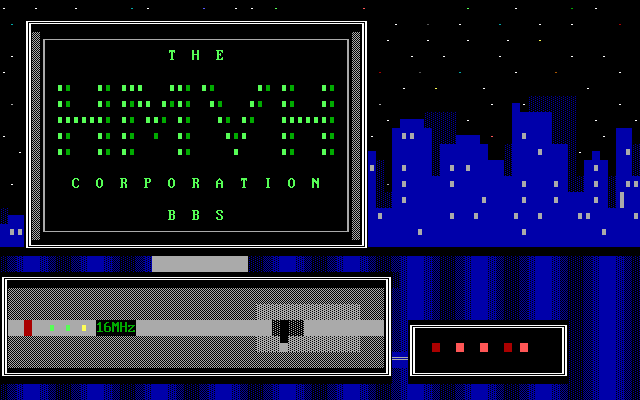
The original welcome screen 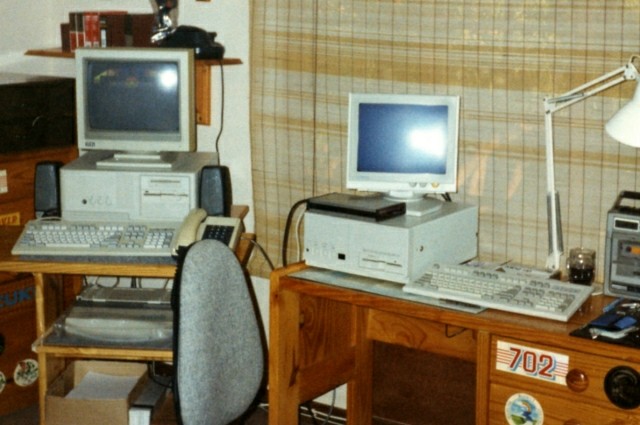
The original hardware. The BBS machine claimed most of the desk. Surely that wasn't an omen? A European safari and another hardware upgrade later the BBS went online again. The 15th of December 1994 is now historically regarded as the official launch date, just in time to make it into the January 1995 issue of Roblist -- which by then was detailing over 180 unique BBSes in South Africa. All was well with the world. DemographicsThe largest BBS at the time, Digitec Online, boasted 30 nodes. Oh yes, the online community thrived in the early nineties -- long past the time when Atari or Commodore devices ruled the home computer roost. In fact, I'm not aware of there having ever been any Commodore- or Apple-based BBSes. Sure, there were a handful of Amiga boards and probably similar numbers of UNIX-, Novell- and OS/2-based ones but otherwise it was all DOS -- enhanced, at best, by 4DOS or DESQview. BBS software stuck largely to the well-known ANSI-graphics stalwarts of the day, such as Major BBS, Maximus, PCBoard, ProBoard, Renegade, RemoteAccess, or Wildcat! The lingua franca on all bulletin boards was English. This is rather interesting considering that only just over two million (out of a population of 40 million) residents would probably regard English their first language (although the vast majority of the population understands it). There were no Afrikaans-language BBSes, let alone any in the Sotho, Xhosa, Zulu or other indigenous languages. Equally interesting was the racial make-up of BBS users and SysOps. I remember distinctly that my BBS had no black African users (although they were welcome, of course). Further analysis of the January 1995 issue of Roblist reveals that there were all of two system operators of Indian ethnicity -- based on their names and BBS locality (area code). Making more telemarketer assumptions based on the SysOps' surnames in the same data set (the error margin should be negligible), it might be interesting to learn that about 35% of SysOps were Afrikaans speakers. 48% spoke some dialect of English while 17% of the surnames were of clearly foreign origin (Dutch, German, Greek, Israeli, Italian, Maltese, Portuguese, etc.) and in all likelihood would've ticked "English" as primary language (if not mother tongue) in a census. Since there are no "typically black African" names listed, it could be interpreted to mean that there were over 180 BBSs in a country of 40 million, of which not much more than 6 million (roughly the population of Denmark or the US State of Maryland) would be likely users. Or is this too stretched a deduction? (Oh, and this was after apartheid was dismantled.) "One settler - one bulletin board" indeed! A cursory glance at the exchange area codes in the old 011 Witwatersrand Region reveals that there were only about a dozen boards operating from the West Rand and "the South" (mostly Turffontein/Rosettenville) put together while a similar amount were based in the East Rand (from Alberton all the way to Springs). About five were in Central Johannesburg (mostly Marshalltown/Braamfontein) and the rest were all tucked away neatly in the affluent Northern Suburbs (from Parktown all the way to Midrand). Not a single BBS operated out of a "black township". Within the entire country's listing only five female names appear under "SysOp", holding true the clichéd assessment that operating a BBS was the general domain of rich, white boys. Mark 2Meanwhile, this white boy upgrades the BBS modem to 28800bps. Then the phone line went to shit. Line noise. Users couldn't connect. Downgrade to 14k4 again. Also re-design the menu screens, register RemoteAccess, get a different phone number/line, next attempt at 28k8 with a different modem, and then a lightning strike takes out some of the BBS hardware. Later that modem also packs up, may as well upgrade to 33k6 despite Telkom being unable to acknowledge(1) and eliminate the line noise completely. This strained my hopes of joining a few mail networks. 1996 was certainly an eventful year. Somebody please remind me again why I'm doing this? 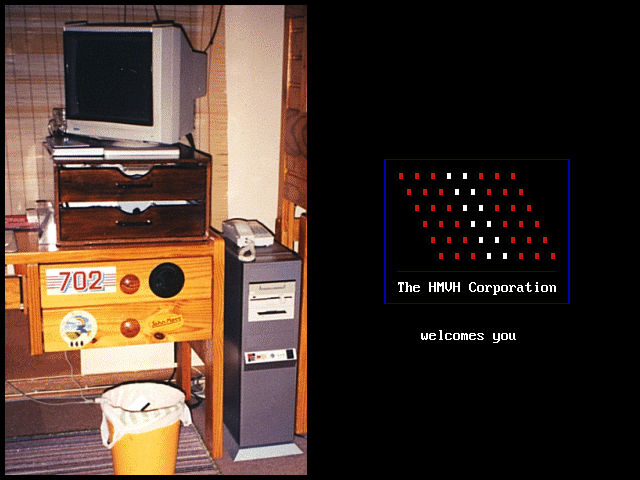
Updated hardware and reclaimed desk space. ExodusMeanwhile, South Africans began flocking over to the colourful pastures of the Internet, partially on account of the runaway success of Windows 95 that was pre-installed on many a new PC. Compuserve and AOL discs swamped everyone's post box, and BBSes suddenly slipped out of favour -- assuming people were aware of them to begin with. I can't shake the feeling that many new modem owners honestly thought that the internet they were dialling into was the same thing as this bulletin board stuff they may have already heard about from somewhere else. Nonetheless, callers weren't exactly fighting each other anymore to log on, but at least there was a sufficient stream of die-hards and curious newbies to keep the exercise interesting enough and this BBS alive. Besides, Gopher just didn't do it for me personally; I had all the Usenet newsgroup and netmail/echomail access I needed via Graeme Slogrove's Fast! BBS. I was scraping the primordial web via Japanese Agora servers and much of what I found ended up on the BBS anyway. The early imdb.com FAQs were particularly enjoyable. 1997 got off to a great start with the hard drive controller packing up. Add to this another series of unfortunate and tragic events that I decided I'd had enough and turned the BBS off until further notice. There wasn't even the need to have Roblist updated because it too ceased publication. The final issue from December 1996 listed all of 80 BBSes in South Africa. Chicxulub had arrived in the form of the WWW -- these dinosaurs were going extinct. The BBS was fired up again on the 16th of June 1997 at new premises on a new number and a noise-free phone line. I obviously have certain masochistic tendencies. Besides, I had a responsibility to the few users that had made monetary donations. By far the technically most successful year, 1998 also meant a slow death for this (and others too) BBS, despite having clocked up FOUR YEARS online. There are hardly any callers, and the ones that do log on are only the die-hards of the pre-WWW days. Nevertheless, we lumber on, if only to make the adaptation to a WebServer much easier! Reflecting back, today, in 2011, on the history bulletin entry above, I'm hard pressed to remember what exactly it was that motivated me to keep the system on life support. BBSes were a dying species well past its prime as I, myself, already raved on about in 1997. But instead of growing fur and giving birth to live young, some of the SysOps were growing feathers. Many took flight and left the country. Others evolved into ISPs. I too joined the mammalian herd on the WWW. The BBS was kept running mostly as a database for my increasing collection of weird and wonderful image files because, well, as digital photography became affordable, we slowly began receiving very naughty pictures of couples and members' girlfriends engaging in holy-moly matrimonial activities and poses. Things stayed interesting. We had a strange little clique. There was always some hare-brained scheme waiting to be hatched: the BBS was the official distributor of two user-created adult newsletters and later a small selling front for adult CD-ROMs. All of these ventures were short-lived but in some naïve and optimistic sense I suppose I was also hoping for a means to extend and connect the machine to the Internet, trying to figure out a way to become a part of it -- along with its features. An FTP server alone wouldn't have satisfied. End of daysAnd while the BBS bug still had its teeth firmly entrenched in my gluteus maximus, another was already looming on the horizon: Y2K. I had originally chosen to run the HMVH Corporation BBS on RemoteAccess, largely on account of its flexibility and the vast amount of add-ons available. However, a year 2000-compliant version was nowhere to be seen yet, in part due to the program having since been sold by original author Andrew Milner. Furthermore, there were no updated versions of several doors and utilities the BBS had come to rely on -- in fact, many of their authors also closed shop. Migrating to other software just wasn't worth the effort. The BBS was doomed to fail. A faint glimmer of hope shone through when news arrived of Dutchman Niels Schoot being busy developing a Win32-based clone of RemoteAccess before, like many similar projects, it also disappeared in the digital ether. BBSes were simply an evolutionary dead-end. 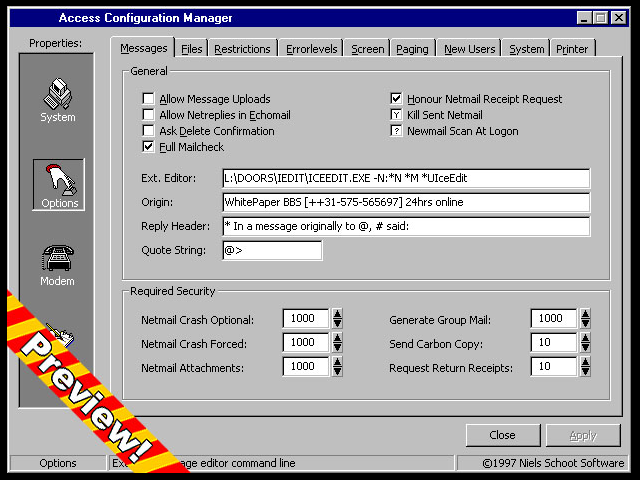
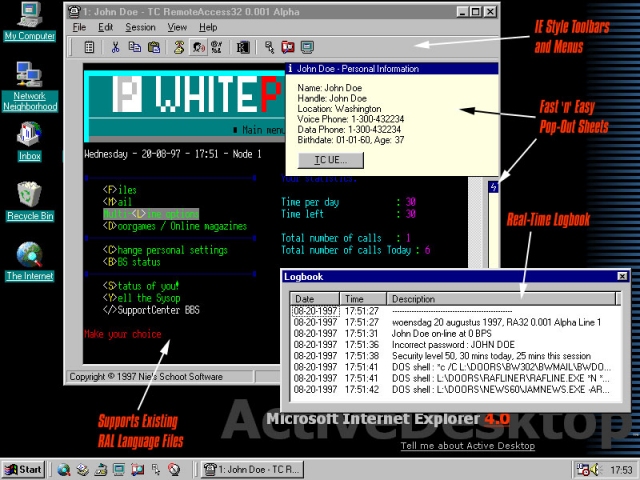
TCRemoteAccess32 screen shot. Click for larger view. The year 2000 arrived without as much as a whimper (not counting the hangover). Civilization magically survived its own invention called a "calendar" that tracks the abstract concept of time flipping over to a new millennium. The BBS did not fail, it did not blow up; instead, it was humming along quite peacefully. A few of the lesser utilities did report back weird date-specific values, so I simply deleted the ones that had become obsolete. Even RemoteAccess 2.02 continued to function -- only the "new files" scan didn't work anymore. A Y2K-compliant update was not to be released by the new owner until later that year. Go figure! Not that it mattered -- there were almost no callers. I slowly moved the files off the BBS and onto new projects, then backed up whatever statistics(2) and high scores I could before I went kevorkian on it and pulled the plug on the 27th of April 2000(3). The BBS had clocked up a total of 9528 calls in the 5½ years it limped along. RevelationAll things considered that's not such a bad number. It should have been higher, though. It could have been higher were it not for the paltry phone line. It could have been better if this hadn't prevented the BBS becoming a reliable *net node which would have pulled in more mail which, in turn, could have pulled in more users which may have resulted in whatever happens afterwards. The BBS might have been more successful if it had been launched a few years sooner, or in another country(4), or specialised in something like underground stuff and demos, games(5), music/trackers, text files, Star Trek, or midget porn. Heck, it could have even been more successful if it wasn't run be me and my unpronounceable name who then christened his board something as peculiar as the HMVH Corporation BBS! Maybe we were too general, too formal, too strict, or too male? What I've learnt is that a female SysOp (even if only by name) would have pulled in lots of callers. That's how geeks are. Maybe it lacked a feminine touch or, worse still, a human touch? Did the BBS make a too corporate impression? Was the SysOp too anonymous? Basic marketing courses would surely teach that a female face attracts attention while a personal human touch maintains brand loyalty and returning customers if the above criteria is met (and the product is good and professional). Beats me. I didn't run the BBS as a business. I ran a BBS for fun, and I had a terrific time doing so. Despite the late start and several setbacks I just managed to catch the tail end of something very, very special. And that alone was worth it. A crude simulation of the BBS can be viewed here. Footnotes1. Cables between the DLU ports and the MDF at Meredale exchange running over the -48V bus bars might explain why all 941 area code numbers were affected (but not 942 ones), as we had already determined. Voice callers wouldn't have noticed -- which is why this data user was the only one who complained. I remember that the Nancefield EWSD (switch) engineer in charge called me a few years later to find out if and how I eventually solved the issue because complaints from other subscribers who couldn't connect to the Internet started pouring in. I have no idea what happened thereafter. 2. The ANSI files for the menu screens, of all things, got lost over the years. Crud. 3. It's an ironic coincidence that the 27th of April is a national/bank holiday called "Freedom Day". 4. Long distance calls weren't cheap. The BBS did not have too many visitors from beyond the national borders but that didn't deter us from calling up many overseas boards ourselves. Let me go on record and state that, with the exception of the big and commercial ones, the average private SA BBS was definitely on par with anything that the so-called first world offered. 5. We made a point of calling up Apogee's BBS every so often to grab their latest games. Acknowledgments: Rob Fisher (for the treasure trove that is Roblist), Åke Wallebom (for a customised version of the RA2HTML utility), Roy/SAC (for his ASCII/HTML converter), friends and colleagues (who humoured this madman), and all my BBS users (without whom there'd be no BBS and no content). This page last updated: 06-05-2022
|